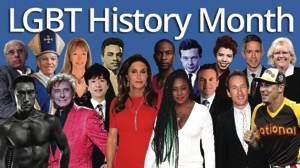
LGBT History Month, a once inconceivable concept, includes wrangles about teaching LGBT history in schools as “concerned parents” face the horror of their innocents becoming aware of us and our past. Yet even if details are skimmed over or omitted, there would (should) be acknowledgement of our existence and the many men and women, our brothers and sisters, of great accomplishment.
Our struggle to join the mainstream and be appreciated can’t be ignored now that we appear, however grudgingly, as positive examples throughout all media including the prime time hit Will and Grace with our lifestyle as its center.
One might assume, therefore, we have at least a general knowledge of our own history. Sadly, I learned otherwise. The recent joke about Will’s young friend not understanding the difference between Stonehenge and Stonewall was being discussed and enjoyed at one of my meetings when a twenty-something announced he had never heard of Will nor Grace! Worse, after saying he knew about Stonehenge, he asked, “What’s a Stonewall?” Our group’s belief we somehow had an innate knowledge of the basics of our LGBT-ness was shattered.
If this is an example of what gay youths learn of our/their past, we are not even a textbook footnote. The teaching then is up to us. When a notable event comes up when chatting with a young person, casually relate its importance. Don’t lecture; you’ll lose them. Rave about a book, movie, TV, play, etc. which chronicles our history, recounts its successes, portrays its champions or states its future goals. With luck, they’ll investigate. Do it, not just this month – every month.
Hanging below his knees
“Hanging below his knees,” a not uncommon expression in my neighborhood, is more difficult to understand than one might think. I became aware of the complications when my partner asked if his new shorts were hanging under his knees; corrected himself using “below” and then asked which was correct. I started to tell him “below” was the common turn of phrase, but realized I was at a loss to explain why. I thought about: “It’s under/below the table,” or “He’s under/below 18” compared to “It’s under/below 18 degrees.” I wished I was back in the classroom where my rulings were gospel without pesky justification.
As seniors, our vocabulary remains basically unaffected by modern changes such as the new words in the LGBT world and its growing parade of anagrams (LGBTTIQQ2S, in a later article) and newly coined words flooding the Internet, politics, etc. Most are now in general use by one, even two, generations behind us.
We claim to be right, but we are the ones being laughed at as we fumble with our computers and phones and can’t understand the hit songs, raps (what?) or even people at the next table.
By trying to educate others as to the “real” meaning of a word or the “right” way to do something, we further isolate ourselves. Of course, we are right, but let’s give adaptation/innovation a chance. Attempting to defend our choices often makes things more complicated and unclear. Accept and enjoy the now. The whys and wherefores take too much time and no one cares. As for “below/under the knees” problems, one answers in a stern, assertive voice then instantly moves on. The main point here being whether it does or it doesn’t.















